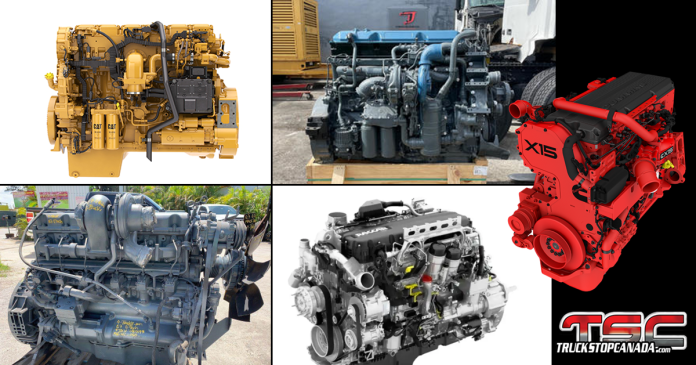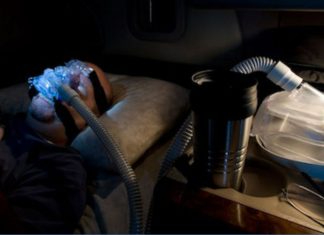The Colorful World of Engines: An Overview of Truckers’ Preferences | In the world of trucking, every detail counts, and the preference for certain brands and engine colors is no exception. Based on a survey of over 298,000 Facebook followers, we’ve delved into the colorful universe of heavy-duty vehicle engines to discover which are the favorites and why. Here’s an overview of the five most popular engines according to the responses we received:
CAT: 37%
The yellow of Caterpillar engines is iconic in the world of heavy-duty engines, often associated with robustness and reliability. These engines are widely recognized for their endurance and ability to perform in challenging conditions.
Patrick expresses a clear preference for the yellow engines of Caterpillar, evoking unwavering support for this distinctive color and what it represents in terms of performance and reliability. Several other users, such as Sébastien J. and Michel T., also emphasized that “a real engine is yellow,” highlighting their preference for Caterpillar.
Cummins: 24%
The bright red of Cummins engines is often associated with power and performance. These engines are known for their excellent torque and reliability, making Cummins a popular choice among truckers for various demanding applications.
Eric CB. mentioned his positive experience with the Cummins N14, highlighting its impressive longevity with more than 4,400,000 km on the odometer. Daniel L. praised Cummins for its combination of power and reliability, ranking it among the best alongside Cat.
Detroit Diesel: 22%
Detroit engines are known for their reliability and fuel efficiency. These engines are appreciated for their longevity and require fewer frequent repairs.
Sylvain A. specifically mentions that his Detroit engine “runs like new” even after 780,000 km, underlining the significant longevity of these engines. Michel C. enjoys the distinctive sound of the Detroit Series 60, appreciating its unique features.
Mack: 8%
Mack engines are respected for their robustness, although they are mentioned less frequently than other brands.
Mathieu MB and Dan B. unequivocally state that Mack engines are by far their favorite. Pierre St-L. supports this by talking about durability, unlike other engines which, according to him, need to be rebuilt much earlier.
Paccar: 7%
Paccar is sometimes criticized for certain limitations, but it is also appreciated for its fuel economy and accessible purchase cost.
Pascal P., as a broker, notes the economic benefits of Paccar engines, highlighting that they are cheaper to purchase and fuel-efficient, making them attractive for budget-conscious operations.
And what does the trucking industry say?
Cummins is renowned for its powerful and efficient diesel engines. The X15 engine is particularly notable, offering up to 605 horsepower and 2,050 ft-lb of torque. This engine is known for its improved fuel efficiency and reduced emissions, meeting future regulations without significant changes to its ‘architecture’. Cummins integrates advanced technologies such as predictive gear shifting and energy efficiency optimization through its collaboration with Eaton Cummins and Cummins-Meritor, making it a leader in the trucking industry.
The PACCAR MX engines, including the MX-13, are highly appreciated for their performance, fuel economy, and reliability. These engines feature redesigned internal components that improve fuel economy by up to 3.4% depending on the model and application. They are known for their robust design and advanced combustion technology, ensuring optimal power while adhering to strict emission standards. The MX-13, for example, offers up to 510 horsepower and 1,850 lb-ft of torque, making it suitable for a range of demanding applications.
Caterpillar, Detroit Diesel, Mack, and Volvo are well known in the trucking industry. Caterpillar has historically been recognized for its robust engines ideal for heavy-duty applications. Detroit Diesel is often noted for its fuel efficiency and compliance with environmental standards. Mack engines are famous for their durability and power, and Volvo is recognized for its innovative and environmentally friendly engine solutions.
The future of truck engines is decidedly turning towards green technologies, with an emphasis on reducing emissions and improving energy efficiency. Truck manufacturers, like Volvo, are at the forefront of this transformation, investing in the development of battery electric engines and hydrogen fuel cells. Volvo, for example, predicts that battery-electric trucks will represent the majority of zero-emission vehicles on the roads by 2040, while continuing to develop internal combustion engines for specific uses where electric alternatives are not yet viable.
Hydrogen is also seen as a key energy vector for the future, particularly in long-distance transport applications where direct electrification poses challenges. Volvo and Daimler have formed a joint venture to develop together hydrogen fuel cell technologies, highlighting the potential of this technology to significantly reduce greenhouse gas emissions in the trucking industry.
Moreover, advancements in recharging infrastructure and policy incentives will play a crucial role in accelerating the adoption of these clean technologies. Studies suggest that by 2035, battery-electric and hydrogen trucks could become less expensive to purchase, operate, and maintain than their diesel counterparts. Only time will tell the truth!
In conclusion, an engine’s color often reflects its brand and what it stands for in terms of performance, reliability, and efficiency. Preferences vary based on personal experiences and the specific needs of each trucker, but one thing is clear: each color tells a story of loyalty, performance, and identity for those who drive. For enthusiasts, every engine’s roar or jake brake’s rumble is intense music that resonates deeply.
















